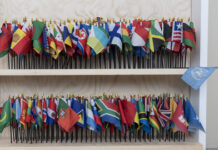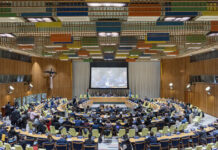Photo credit: DiasporaEngager (www.DiasporaEngager.com).
The Hamas terror group said it was battling Israeli troops on the outskirts of the Gaza Strip’s crowded southern city of Rafah on Wednesday after a US official said Washington had halted a shipment of powerful bombs that Israel could use in military operations.
The United States, which is seeking to stave off a large-scale Israeli offensive in Rafah, said it believes a revised Hamas ceasefire proposal may lead to a breakthrough in an impasse in negotiations, with talks resuming in Cairo on Wednesday.
Israel has threatened a major assault on Rafah to defeat thousands of Hamas terrorists it says are holed up there, but Western countries and the United Nations have warned a full-scale attack on the city could worsen an already dire humanitarian situation in the Palestinian enclave.
Hamas said its fighters were battling Israeli forces in the east of Rafah, where hundreds of thousands of Palestinians have sought refuge from combat further north in the enclave. Islamic Jihad, another Palestinian terror group, said its fighters attacked Israeli soldiers and military vehicles with heavy artillery near the airport east of Rafah.
Around 10,000 Palestinians have left Rafah since Monday, said Juliette Touma, spokesperson for UNRWA, the UN agency for Palestinian refugees. The Hamas-run Gaza government media office put the number at tens of thousands.
A senior US official said President Joe Biden’s administration paused a shipment of weapons to Israel last week in an apparent response to the expected Rafah offensive. The White House and Pentagon declined to comment.
The official, speaking on condition of anonymity, said Washington had carefully reviewed the delivery of weapons that might be used in Rafah, and as a result paused a shipment consisting of 1,800 2,000-lb bombs and 1,700 500-lb bombs.
This would be the first such delay since the Biden administration offered its “ironclad” support to Israel after Hamas’ Oct. 7 attack. Washington is Israel‘s closest ally and main weapons supplier.
A senior Israeli official declined to confirm the report: “If we have to fight with our fingernails, then we’ll do what we have to do,” the source said. A military spokesperson said any disagreements were resolved in private.
Israeli tanks rolled across the Rafah border crossing between Gaza and Egypt on Tuesday.
The complex was closed for a second day on Wednesday, according to the Gaza health ministry, but Israel said it was reopening the other crossing in southern Gaza, Kerem Shalom, through which most aid to Gaza has been delivered recently.
The Israeli military said it had uncovered Hamas infrastructure in several locations in eastern Rafah and its troops were conducting targeted raids on the Gaza side of the Rafah crossing and airstrikes across the Gaza Strip.
It has told civilians, many of whom have been uprooted several times already, to go to an “expanded humanitarian zone” in al-Mawasi, some 20 km (12 miles) away.
Armed groups of Hamas, Islamic Jihad, and Fatah said in separate statements that gunfights continued in the central Gaza Strip, while residents of northern Gaza reported heavy Israeli tank shelling against eastern areas of Gaza City.
CEASEFIRE TALKS
In Cairo, delegations to negotiations from Hamas, Israel, the US, Egypt, and Qatar reacted positively to their resumption on Tuesday and meetings were expected to continue on Wednesday, two Egyptian sources said.
CIA Director Bill Burns was to travel from Cairo to Israel on Wednesday to meet Israeli Prime Minister Benjamin Netanyahu and his Mossad counterpart, an Israeli government source said.
Israel on Monday declared that a three-phase proposal approved by Hamas was unacceptable because terms had been watered down. White House spokesperson John Kirby said a new text presented by Hamas suggests the remaining gaps can “absolutely be closed.”
The proposal included a first phase with a six-week ceasefire, an influx of aid to Gaza, the return of 33 Israeli hostages, alive or dead, and the release by Israel of 30 detained Palestinian children and women for each released Israeli hostage, according to several sources.
Since a week-long ceasefire in November, the only pause so far, the two sides have been blocked by Hamas’ refusal to free more Israeli hostages without a promise of a permanent end to the conflict and Israel‘s insistence on only a temporary halt.
The war began when Hamas terrorists invaded Israel on Oct. 7, killing about 1,200 people and abducting 252 others as hostages. Of those kidnapped, 128 remain hostage in Gaza and 36 have been declared dead, according to the latest Israeli figures.
Israel responded with a military campaign in neighboring Gaza, which is ruled by Hamas, aimed at freeing the hostages incapacitating the terror group to the point that it can no longer pose a major threat to the Israeli people.
Source of original article: World – Algemeiner.com (www.algemeiner.com).
The content of this article does not necessarily reflect the views or opinion of Global Diaspora News (www.GlobalDiasporaNews.com).
To submit your press release: (https://www.GlobalDiasporaNews.com/pr).
To advertise on Global Diaspora News: (www.GlobalDiasporaNews.com/ads).
Sign up to Global Diaspora News newsletter (https://www.GlobalDiasporaNews.com/newsletter/) to start receiving updates and opportunities directly in your email inbox for free.

































